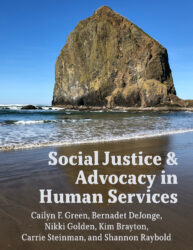Author(s): Cailyn F. Green, Bernadet DeJonge, Nikki Golden, Kim Brayton, Carrie Steinman and Shannon Raybold
 License: Attribution-CC-BY
License: Attribution-CC-BYAffiliation: Empire State College

Social Justice & Advocacy in Human Services delves into the complex realm of social justice, offering a deep dive into historical roots and theories to practical applications in the field. This text covers fundamental concepts, including power, privilege, and oppression, and explores critical issues like racism, gender, sexuality, poverty, religion, and disability in the context of the United States. The last section of the book hones in on the field of human services, discussing power, privilege, and bias in this context, and lastly exploring equitable distribution, human rights, and the systems and entry points within human services practice.
The text provides many resources, videos, definitions, and reflection questions, ensuring readers have a solid foundation in social justice concepts. The authors also present real-world stories and examples, enriching the learning experience. The text also offers educators and students opportunities to explore, learn more on their own, and take actionable steps toward advancing social justice.
Cailyn F. Green, Ph.D., CASAC-M, is the assistant professor of addiction studies and a mentor in the School of Human Services at Empire State University. She earned her Ph.D. in Criminal Justice with a specialization in Addiction Studies from Walden University. Her MS in Forensic Mental Health from Sage Graduate College and her BA in Psychology from Western New England University.
Prior to entering the academic world, she worked as a clinician and case manager for the recently incarcerated struggling with substance use issues. Dr. Green spent time at Albany County Drug Court, TASC (Treatment Alternatives for Safer Communities, a long-term residential facility for recently incarcerated) and St. Peters Addiction Recovery Services (SPARC, both at the inpatient and outpatient level). She also acted as a clinician for virtual global crisis intervention counseling. She is a Certified Alcoholism and Substance Abuse Counselor- Masters level (CASAC-M) through NYS OASAS.
She has been a college instructor since 2014 and has taught in person, hybrid as well as online courses. Her passion is developing curriculum which incorporates real life skills and work tasks to prepare her students for careers in the human service and addiction fields.
Bernadet (Bernie) DeJonge, PhD, CRC, LMHC, has her BA in psychology (1999) and MA in Rehabilitation Counseling (2007) from Western Washington University. Her PhD is from Oregon State University in Counseling (2022). She is currently an Assistant Professor in the School of Human Services at Empire State University. Bernie’s areas of interest include DEIB, the integration of counseling into medical services, online pedagogy, and disability.
Dr. Nikki Golden, LMFT, SUDP, MAC, CMHS is currently an assistant professor at Seattle University in the Counseling Program. She is a licensed Marriage and Family Therapist (LMFT), a Substance Use Disorder Professional (SUDP), a Masters of Addiction Counselor (MAC), and a Child Mental Health Specialist (CMHC). Dr. Golden has extensive clinical experience in both the mental health and substance use disorder fields. Dr. Golden’s areas of clinical expertise include addictions, clinical supervision, co-occurring disorders, relationships, sexuality, trauma and working with the LGBTGEQIAP+ population. Dr. Golden’s research interests include sociocultural identities and relationships, burnout as a systemic issue, sexuality, and trauma.
Dr. Brayton received a joint law and clinical psychology doctorate in California at Palo Alto University and Golden Gate School of Law. She is a professor at Russell Sage College where she heads the program working with students in forensic mental health. Additionally, she has a private practice where she specializes in treating adult survivors of trauma and forensic assessment. In her spare time she enjoys golf, reading and the various exotic locations she bikes through on her stationary bike.
Carrie Steinman, Ph.D., LMSW, MS, has been a faculty member in the School of Human Services at SUNY Empire State University since 2016. She holds a Ph.D. in Social Welfare from Stony Brook University, an LMSW from Hunter College School of Social Work, and a Master of Science in Counseling and Development from Long Island University. With a Ph.D. in Social Welfare and as a New York State Licensed Social Worker (LMSW), Dr. Steinman brings extensive practical experience to her academic role. She has worked with a range of vulnerable populations, with expertise in child welfare, including foster care, juvenile offenders, and homeless and at-risk youth. Her professional background includes work as both a clinician and an administrator across various agency settings. At SUNY Empire, Dr. Steinman has contributed to curriculum development and revision as a member of the School of Human Services Curriculum Committee. She currently serves as co-chair of the school’s Diversity, Equity, Inclusion, and Social Justice (DEISJ) Committee, which she joined at its inception in 2020. In this role, she has helped integrate anti-racist practices and DEISJ principles into the curriculum.
Shannon Raybold is a Program Administrator for Multnomah Early Childhood Program, which provides special education services to over 3,000 children ages birth-5 years old in the Portland, OR metro area. She has a BA in Special and Elementary Education from Western Washington University, a master’s degree from the University of Washington specializing in Autism and low incidence disabilities, and is currently completing her EdD from Portland State University in Special Education Leadership. Shannon has been a practitioner in the field of special education for over 20 years, working with children from birth through adulthood. She has supported children in public and private schools around the world, in addition to founding a private educational consulting practice. Shannon has provided professional development for teachers and administrators at local, national, and international conferences on a wide variety of topics related to supporting students with special learning needs. In addition, she has written courses for SENIA Academy and MiniPD to build the capacity of educators and administrators globally. She also serves as an Associate Director for SENIA International and is a tireless advocate for children who experience the world in diverse ways.
